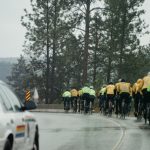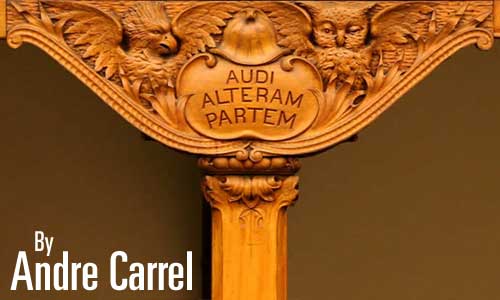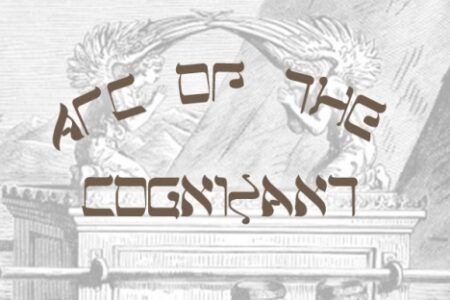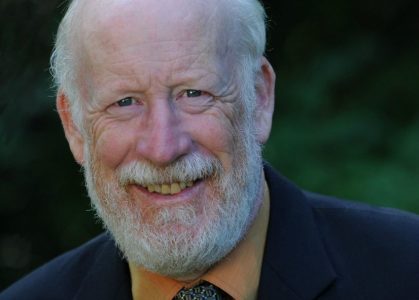COMMENT: Thank You
My lights went out early on a Monday in late November. This had happened to me before. About six years ago it happened at highway speed; the car was totaled and my wife Sue and I were lucky to be unhurt. Last spring, while shopping with Sue in a local supermarket, it happened again; I simply keeled over. I regained consciousness after a brief pause, and felt just fine. In both instances, after extensive examination the doctors could find no cause. After this latest incident Sue took me to the Terrace hospital emergency ward, but as in previous incidents the medical examination revealed nothing of an unusual nature. Everything was in order, but this time, just as we were leaving the emergency ward, my lights went out again.
There is no better place than a hospital emergency room to experience what, on previous occasions, I had flippantly referred to as Microsoft moment. To get a picture of my problem and what they would have to deal with, the Terrace hospital’s emergency ward medical team needed to collect data. I was plastered with sensors and connected to computers with bundles of wires and tubes. Before the day was out the computers recorded two more such heart stopping incidents, one lasting a full 19 seconds. I was fitted with more electronic stuff leaving me so connected that when my heart missed just one single beat acomputer would trigger an electric shock to restart my ticker’s ticking.
After spending the night in the Terrace hospital emergency ward I was transferred by air ambulance to Prince George University Hospital where I was to be fitted with a pacemaker. For three days and nights, first in Terrace and then in Prince George, I was flat on my back, not strapped down but barely able to move, poked by a multitude of needles connected to tubes for oxygen and intravenous drips, and hooked to bundles of wires connecting me to a collection of computers. Whenever my heart missed just one beat I got zapped by a computer. I cannot recall how often I was tasered, but I do remember at 5:00 a.m. on my second day in Prince George when my heart missed nine beats in a row and the computer responded with a rapid fire barrage. What a way to start the day! For the three days leading up to the pacemaker operation I could neither eat nor sleep. I had my book with me, but reading a book under those conditions was rather awkward, and concentrating on what I was reading was near impossible. I had lots of time to think.
I set out to count the number of people who had assisted me, starting from the time I passed out in the emergency ward at the Terrace hospital. I counted the doctors, nurses, paramedics and other care-givers; I added the pilots who flew the air ambulance from Vancouver to take me to Prince George, the ambulance drivers who drove me to and from the airports, and the social worker who attended to take care of any worries I may have had. I also added the cleaners and maintenance workers I observed silently performing their jobs. I could only estimate the number of dispatchers, kitchen staff, and lab technicians working out of my sight. And as a retired administrator I could not ignore the many people engaged to coordinate the work being performed by all the front-line workers.
I could only guess at the education, training, and skills of the people working on and around me. What I experienced with certainty, however, no guessing involved, was the attention all these people paid to what they were doing, and the attitude they displayed in the performance of their work. Across the wide range of their individual tasks, what they all had in common was a positive, friendly, and reassuring attitude. Theirs was not artificial commercialized robo-call friendliness. It did not just feel genuine, it was genuine. They honestly did care about me and how I felt. They went out of their way to do anything they could to make me feel as comfortable as possible, and to minimize my concerns, my apprehensions, and my fears. They did not know me, and I had never before met any of the hundreds of people engaged to take care of me in these critical hours of my life. It is unlikely that I will ever again encounter most of them.
Some may argue that all these people were only doing their jobs, doing what they are paid to do. But were they? Did the Terrace hospital maintenance workers urgently called up to the emergency ward receive extra pay, or maybe a bonus, for having picked André Carrel up off the emergency ward’s floor? Would the cleaners who kept my station spotless, around the clock, to protect me from possible infections have suffered a cut in pay had I not been there? I cannot think of a single person involved in taking care of me in some manner during that week who earned extra money, or who would have earned less had my heart not had a Microsoft moment in the Terrace hospital. With their earnings assured, why were all these people, without exception, so friendly, so positive and so reassuring? Those who had access to my name used it and introduced themselves by name. I am embarrassed to have to admit that I failed miserably in my efforts to muster the decency to retain their names. The sincerity of their friendliness stood in stark contrast to the demeaning tasks many had to perform. So why did they do it? Where do they get the strength to radiate such positive attitudes in the performance of their work?
I gave up counting workers as the count exceeded 100 well before I was moved to the operating room. I decided instead to focus on the budget. I attempted to estimate the cost of the wages and benefits of the people who took care of my needs and wants; the cost of the computers and their programs, and of the many sensors, wires, needles, and tubes connecting me to them. I set out to estimate the cost of the facilities, the furnishings, and all those supplies, from needles to towels, from oxygen to soap. I soon had to give up on that project as well – too much information for my limited brain. What was obvious was that the cost of it all was well beyond my means. Even if I were to set a world record for longevity, the taxes I would be paying as a pensioner for the rest of my life would fall well short of covering the cost of fixing me up. That is when I decided to shift the focus of my reflections to those who would end up being stuck with paying for the costs I was in the process of piling up: that is you.
Thinking about that aspect of my experience brought to mind a remark by the late British Prime Minister Margaret Thatcher, as she was being interviewed by Women’s Own magazine in October 1987: “There is no such thing as society. There are individual men and women, and there are families. And no government can do anything except through people, and people must look to themselves first.” I now know with absolute certainty that Maggie Thatcher was wrong. If all I had to rely on was me and my family, their herculean efforts notwithstanding, Sue would be a widow today, and Matthew and Deanna would no longer have their grandpa. Our family savings and all the money my grandchildren could have scraped together by collecting wine bottles would fall far short of covering the costs associated with supplying and installing my pacemaker. That is not to say that my grandchildren will not end up having to make a contribution. They will, particularly so if the current fixation in our political discourse on government programs and the taxes needed to pay for them prevails. With that realization my thoughts turned to the more familiar ground of my interests, my passion for democracy’s philosophy.
People in their communities, by whatever definition we choose to apply to the term, form societies of which they are individual members. We are not production or consumption units of an economic system, we are people. We, all of us, have the capacity to find ourselves, wholly unprepared and when we least expect it, in a situation of utter dependence on others, on total strangers albeit members of our society. Philosophically I have held to that belief for many years, and by the time my heart was disconnected from the Taser to run smoothly on cruise control, that belief was anchored in solid rock.
I was returning home to Terrace on the overnight bus from Prince George when I concluded that the only possible way I could thank all the people who took care of me, directly and indirectly, was to publicly acknowledge what they had done for me, a total stranger. To you who took care of me, from doctor to cleaner and administrator to researcher, and to all the members of my society who will have the responsibility to pay the full cost of all the goods and services I have benefited from, thank you … from the bottom of my heart.
Andre Carrel is a retired City Administrator, journalist, author, and full-time grandpal.


























Comments